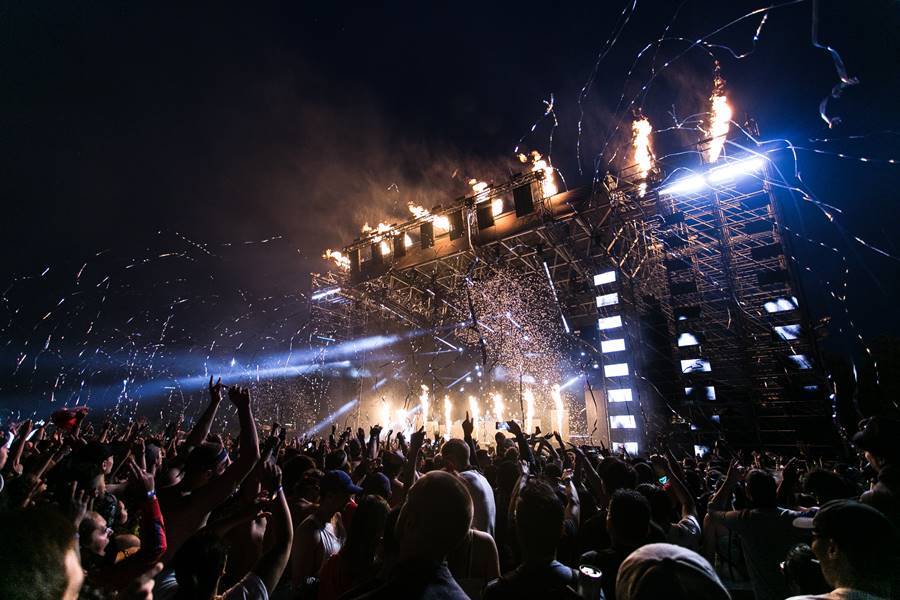
By Jae-Ha Kim
Chicago Sun-Times
January 20, 2003
If you’re lucky enough to have tickets for the Rolling Stones concerts Tuesday and Wednesday at the United Center, chances are you’re going to be too busy gawking at Mick Jagger and Keith Richards to notice the fella walking around the arena with his handheld computer.
But that fella–one of the whizes from Mount Prospect’s db Sound–will have a huge impact on how good–or bad–the Stones sound.
“Arenas are closed vessels and can be hellish because there’s so much reverberation inside,” said Harry Witz, co-founder and president of db Sound. “It’s not like doing the sound in some of the older theaters that were designed for an opera singer to stand and sing. We have to have different sound adjustments in different zones so it sounds just as good in the first row as it does in the upper balcony or the back of the hall.
“So we have a guy with a wireless touchpad computer walking around at each show. He’ll go to different areas of the venue and make adjustments remotely. Every time he does this, the adjustments go into memory. So the next time we go to a venue that’s similar to the United Center, we’ve already a starting point to work with.”
When it comes to creating great sound for venues, size doesn’t matter.
Live music often sounds better at the United Center–which was built to showcase sports–than it does in the smaller Aragon in Uptown, which is infamous for its horrendous acoustics. Not even the best technicians can create an Orchestra Hall atmosphere out of a sound pit, but they try.
If Jagger, Richards or any of the other musicians want the sound tweaked, they’ll relay that information to their own sound engineers, who’ll tell db Sound’s crew chief or system engineer what they’d like done.
After being in business for 24 years, db Sound isn’t fazed by the demands of the world’s greatest rock ‘n’ roll band. Back in the early days, db Sound was based in Des Plaines and had just one account–the rock group Kansas. Today, its client list includes Aerosmith, Red Hot Chili Peppers, Dr. Dre and, of course, the Rolling Stones.
Like many other businesses in the 1990s, db Sound encountered rough times, but unlike many other businesses, db Sound survived.
Witz salvaged the company by downsizing to a skeleton crew of five employees who worked for no pay for half a year and survived on unemployment.
“If it hadn’t been for their dedication and belief in the company, we would not have been able to keep our doors open,” he said. “It was a tough time for all of us, and something few of us will forget.”
In 1994, Witz brought in new partners and investors, and reorganized the company, including the addition of a CFO to oversee the business end. Three years later, the company nabbed the holy grail of the rock world when the Rolling Stones selected db Sound to handle the “Bridges to Babylon” tour.
But even with that edge, snaring the current “Licks” world tour wasn’t a done deal.
“The Stones had been using a sound company from Dallas and were in the market to try something new,” Witz said. “They got a new sound engineer who remembered working with us on an AC/DC tour. He recommended us to the Stones, which got us in the door. But we still had to write up proposals and do demonstrations. We went against three other companies, and finally won the tour.”
With a full-time staff of 25, db Sound juggles between four and 20 events on any given day. It also works closely with sister companies in Japan, Australia and Germany.
The company charges between $2,000 and $250,000 for each event, but that doesn’t mean the fiscally frugal Jagger and his bandmates are shelling out a quarter-of-a-million dollars per night.
“Special consideration is given for a tour versus a single-night event,” Witz said. “The time it takes to prep for a tour is pretty much a one-time thing, so for something like the Stones, we amortize it over the year. And we always offer discounts for repeat business.”
As for the glamor of working with some of the most famous musicians around, Witz said, you get over that fast.
“You don’t work for a sound company for the glitz,” Witz said, laughing. “We’re the unsung heroes and the people to blame. No one goes to a concert and says, ‘That’s the best sounding concert I ever heard!’ They’ll say, ‘That’s a great band.’ Or if it’s a band they really like that wasn’t good that night, they’ll say, ‘The concert sounded bad.’ Bands play in good- and bad-sounding places. Our job is to overcome the bad-sounding places, but there’s not much we can do if they’re having a bad night.”